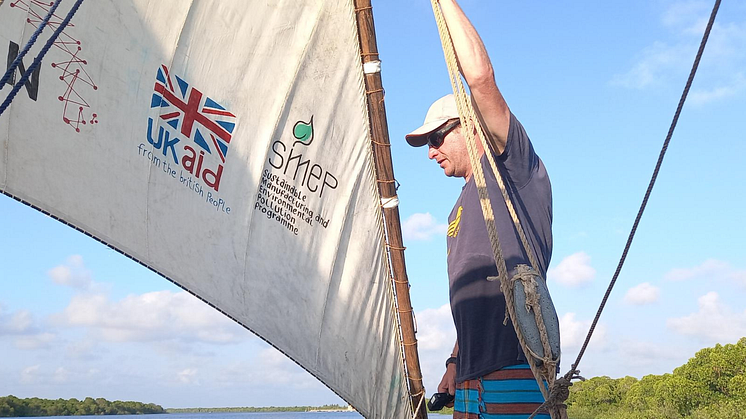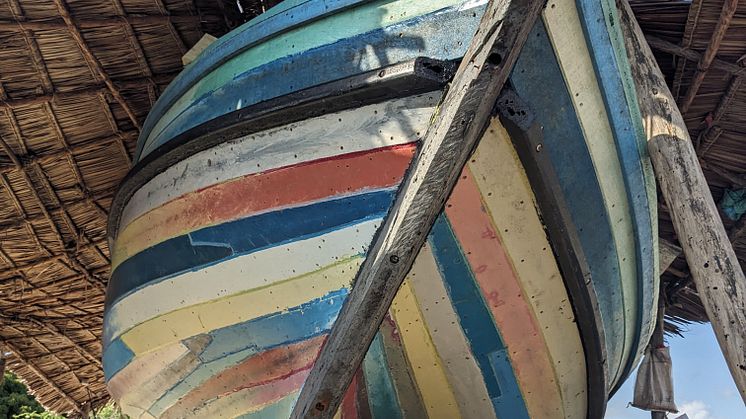
Press release -
Toolkit shares real lessons from the frontlines of plastic recovery
The team behind a circular economy initiative aimed at tackling plastic pollution, which includes experts from Northumbria University, is celebrating the launch of a toolkit designed to provide practical guidance on setting up recycling schemes across the world.
The Flipflopi Project based in East Africa promotes solutions for plastic recovery, recycling, and sustainable livelihoods in coastal and island communities by running education programmes to help generate public support and engage with policymakers on reducing plastic waste. The project is perhaps best known for creating the world’s first traditional dhow sailing boat made entirely from recycled plastic, including more than 30,000 discarded flip flops collected from the coast of Kenya.
Now, the Flipflopi Toolkit: recycling solutions for remote communities, has been launched as a comprehensive resource to help small and medium-sized enterprises, community-based organisations and non-governmental organisations develop resilient plastic recovery and recycling programmes.
Many recycling initiatives struggle due to high operational costs, limited market access, and technical challenges. Simon Scott-Harden, an expert in product and material design from Northumbria University, first became involved in the Flipflopi Project in 2017 and said the resource had been put together to share proven strategies and best practices with organisations facing these challenges.
“As part of the Flipflopi Project’s commitment to knowledge sharing, we created the toolkit covering all areas we have developed, drawing on our own experiences, successes and failures and hopefully providing useful practical insights for others,” explained Simon, who teaches on the Product Design BA (Hons) programme at Northumbria’s School of Design, Arts and Creative Industries and has supported the project alongside Dr Phil Hackney, Associate Professor in mechanical engineering and Senior Technician, Johnny Hayes. “The content was written by the Flipflopi team allowing us to ensure a dynamic and living tool.”
The toolkit provides step-by-step guidance on setting up and running a successful recycling initiative, covering:
Plastic recycling essentials
- Local outreach – encouraging participation and awareness.
- Feedstock – collecting, sorting, cleaning, and solving common problems.
- Recycling – creating valuable items from recycled plastic.
- Enterprise – understanding markets and building a business.
- Tracking impact – measuring environmental, social, and business results.
Scaling your impact
- Research and development – improving materials, processes, and techniques.
- Teaching – sharing knowledge through training and education.
- Partnerships – working with governments and municipalities to improve waste systems.
- Policymaking – informing decision-makers on supporting circular economies.
- Campaigning – lessons from pushing for stronger laws, and how to start.
“By sharing what we’ve learned, we hope coastal and remote communities are better equipped to tackle plastic pollution with environmental, social and economic benefits,” said Davina Ngei, Programme Manager at the Flipflopi Project. “The toolkit is a practical and adaptable resource for any organisation looking to make community-based plastic waste management work in challenging environments.”
The toolkits are supported through the Sustainable Manufacturing and Environmental Pollution (SMEP) programme established by the Foreign, Commonwealth and Development Office (FCDO) and implemented in partnership with the United Nations Conference on Trade and Development (UNCTAD).
The toolkits conclude the Flipflopi Mitigating Plastic Pollution through Heritage Boat Building project, which was supported by SMEP funding between January 2022 and March 2025, involving partners CORDIO East Africa and the University of Portsmouth, as well as Northumbria University. In the early part of the project, Simon travelled to Kenya to help establish a new heritage boat building training centre where indigenous knowledge and skills are used to transform single use plastics into traditional sailing vessels.
Discover more about the Flipflopi Project here and download the free toolkit at toolkit.theflipflopi.com
Ends
Notes to editors
About the SMEP programme
The Sustainable Manufacturing and Environmental Pollution (SMEP) programme has been established by the Foreign, Commonwealth and Development Office (FCDO) and is implemented in partnership with the United Nations Conference on Trade and Development (UNCTAD).
The toolkits are supported through SMEP as part of Flipflopi's “Mitigating Plastic Pollution through Heritage Boat Building” Project which was funded from January 2022 - March 2025 (Consortium partners: University of Northumbria, CORDIO East Africa, and University of Portsmouth).
The SMEP Programme aims to generate cutting-edge scientific evidence and to improve existing knowledge on the environmental health and socio-economic impacts of selected manufacturing sectors across target countries in Sub-Saharan Africa and South Asia. The programme will also identify technology-based solutions to address the most pressing environmental health issues associated with manufacturing in focus countries and invest in developing business processes and systems to promote the uptake of identified pollution control solutions.
Topics
Categories
UNIVERSITY OF THE YEAR 2022 (Times Higher Education Awards)
Northumbria is a research-intensive university that unlocks potential for all, changing lives regionally, nationally and internationally.
Two thirds of Northumbria's undergraduate students come from the North East region and go into employment in the region when they graduate, demonstrating Northumbria's significant contribution to social mobility and levelling up in the North East of England.
Find out more about us at www.northumbria.ac.uk
--- Please contact media.communications@northumbria.ac.uk with any media enquiries or interview requests ---









